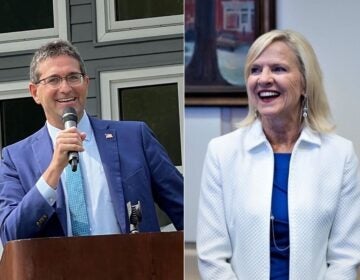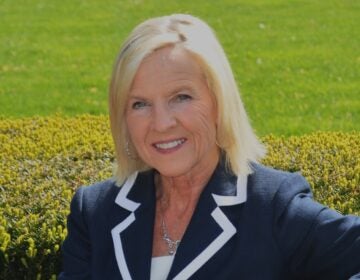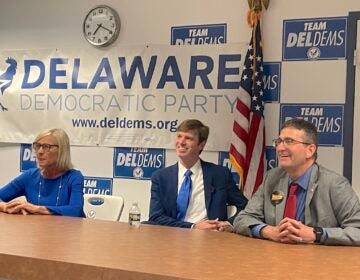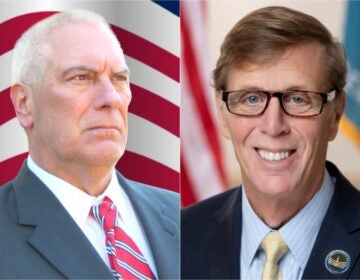Meyer outpaces Hall-Long in fundraising for Delaware Democratic gubernatorial primary
The two announced candidates and one other possible contender had $3.3 million total to spend at year’s end. Nearly half of it came from personal loans.
Listen 2:12
New Castle County Executive Matt Meyer and Lt. Gov. Bethany Hall-Long are seeking the Democratic nomination to succeed Gov. John Carney. (New Castle County/State of Delaware)
This report was supported by a statehouse coverage grant from the Corporation for Public Broadcasting.
From Philly and the Pa. suburbs to South Jersey and Delaware, what would you like WHYY News to cover? Let us know!
New Castle County Executive Matt Meyer has nearly two-and-a-half times more money in his campaign bank account than Delaware Lt. Gov. Bethany Hall-Long in their race for the Democratic gubernatorial nomination.
Yet the two might not be alone in their quest for state government’s highest elective post. With the Sept. 10 primary election just seven months away, a third Democrat — former state Environmental Secretary Collin O’Mara — has been raising money since December for a potential candidacy.
The trio recently filed campaign finance reports to document their fundraising and spending for 2023.
While the documents show that Meyer, Hall-Long and O’Mara are raking in money both in and outside of Delaware, nearly half of the combined $3.3 million “cash on hand’’ they reported last month came from themselves in the form of loans.
Meyer’s $1.7 million in cash includes $580,000 that’s listed as an outstanding loan.
O’Mara, who only began raising money in December, has $870,000 to spend, but loaned himself the vast majority — $750,000.
Hall-Long has the least amount of available money — $688,000 — and $101,100 came from loans for which the candidate said she would not seek repayment.
Hall-Long’s failure to document what she claims were $308,000 in loans to her two lieutenant governor campaigns led to revolt in her nascent gubernatorial campaign within days of her September launch and led her to briefly suspend fundraising.
Her campaign manager, fundraising director, and some volunteers bolted in September after they learned that more than $200,000 in campaign checks had gone to Hall-Long’s husband Dana Long, who had been her campaign treasurer since she entered politics in 2000.
She has since hired a new treasurer and amended seven years of reports showing that Hall-Long — not her husband — had loaned money to the campaign and been paid back $207,000. Hall-Long has contended that she and husband were guilty of sloppy bookkeeping and nothing worse.
The candidates will look to use the millions of dollars to attract votes from up to 100,000 Democrats that political observers say could be voting in the primary. Delaware currently has 353,000 registered Democrats, but only a small fraction traditionally vote in primaries.
The last time Delaware had a competitive Democratic gubernatorial primary was 2008. In that race, 74,000 of the 264,000 registered Democrats — 28% — voted and state Treasurer Jack Markell defeated party favorite and then-Lt. Gov. John Carney. Carney was elected governor in 2016 and is completing his second term. By law he cannot seek a third term.
To entice the 2024 primary voters, the 2024 candidates will use their cash in a multitude of ways, such as buying advertising on television, radio and social media, sending mass mailers to homes, conducting internal polling, and paying staff to organize events, knock on doors, and make calls.
Hall-Long, who has been endorsed by Gov. Carney and several key state lawmakers, including House Speaker Valerie Longhurst, would not agree to be interviewed for this article. Instead her campaign issued a written statement, in keeping with her posture since the controversy over the campaign payments to her husband first surfaced publicly in October.
“We’re honored by the support we’ve earned throughout 2023 — last year our campaign raised over half a million dollars,’’ Hall-Long campaign’s statement said.
The statement touted Hall-Long’s “growing coalition of support” and added that, coupled with her experience, “our campaign is in a strong position.”
Meyer, who raised $876,000 in 2023, said his fundraising is continuing at a rapid pace, and already includes donations from more than 3,500 Delawareans in all three counties. He said the broad base of in-state donors “is really relevant because when you consider someone contributing who’s that enthusiastic about us and their network, and you do math, that’s getting to be a really valuable number in terms of the number of votes we need.”
Meyer said he had no comment on whether Hall-Long’s campaign finance issues are affecting her fundraising and helping him. “I’ll leave that for other people to look at,’’ Meyer said. “We’re laser-focused on developing a vision for addressing the real problems that Delawareans face.”
Meyer said that while his donations far surpass those of Hall-Long and O’Mara, he loaned the money initially because he decided to match donations dollar-for-dollar. That’s no longer feasible since “the numbers are really big,” he said.
O’Mara, who resigned as secretary of the state Department of Natural Resources and Environmental Control in 2014 to become CEO of the National Wildlife Federation, said he began raising money in December to assess support for a gubernatorial bid.
Almost all of the $118,000 he received in donations of more than $100 were from outside Delaware that he told WHYY News were part of his national network of environmentalists. He said he also used Facebook to raise about $5,700 from Delawareans.
Of the 322 total donors in December, O’Mara said 179 were from Delaware. “It was all donations of 5, 10, 20, 25, 30 dollars and I was just trying to see if was there a path there” to get contributions from across the economic spectrum.
O’Mara said he loaned money to the campaign to show prospective contributors that he’s serious about competing financially if he gets in the race.
He will decide by month’s end whether he’s in, and if he is, O’Mara said he believes donors will be generous.
“I think we could raise well north of a million dollars between now and the end of July to make it viable for August,’’ O’Mara said.
The month of August, as every Delaware primary candidate knows, is traditionally when voters actually focus on the races. So it’s critical to have enough money to be able to flood the airways, mailboxes and social media accounts with ads, all designed to win the critical votes needed to move on to the Nov. 5 general election.
And whether it will come from their own pockets or their network of supporters, all indications are that Meyer, Hall-Long, and O’Mara will have it to spend.
Individuals can donate a maximum of $1,200 to a statewide primary campaign, and also give another $1,200 to the candidate that advances to the general election.

Get daily updates from WHYY News!
WHYY is your source for fact-based, in-depth journalism and information. As a nonprofit organization, we rely on financial support from readers like you. Please give today.






